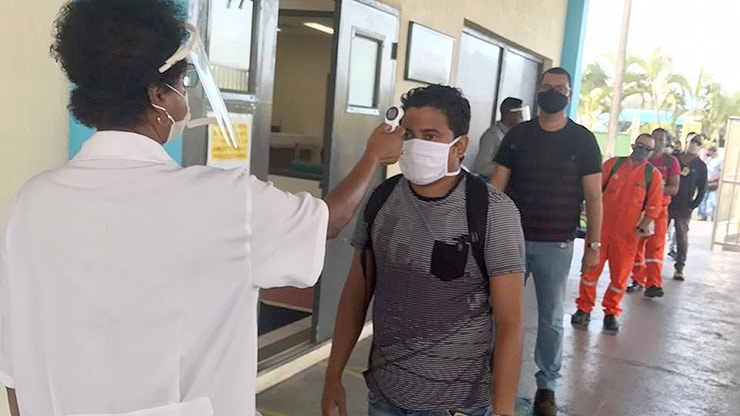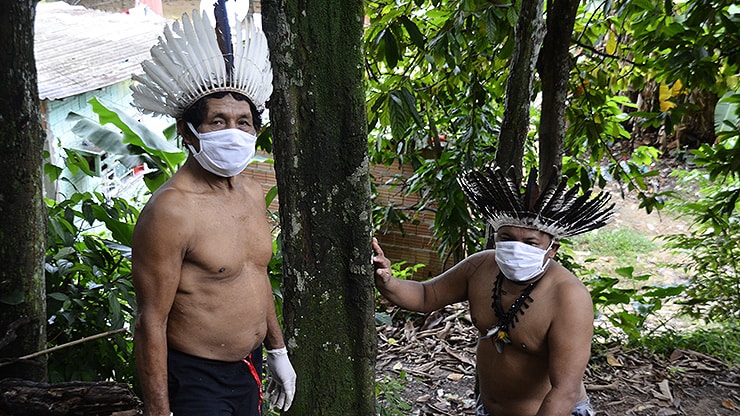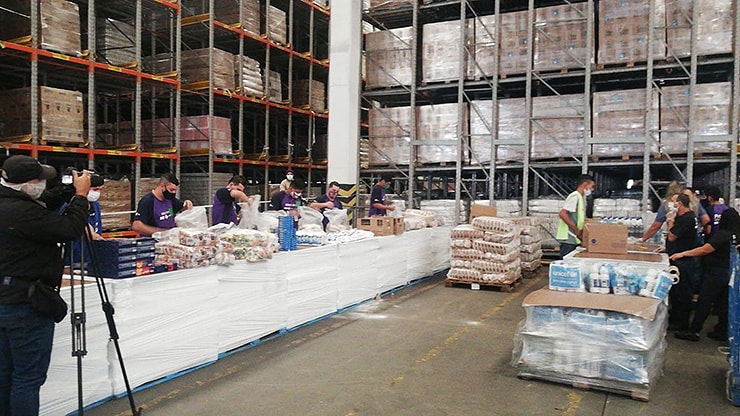How We Are Fighting COVID-19 in Brazil

The coronavirus is raging in Brazil. It has been hit harder by the pandemic than any other country in the world other than the United States. The biggest problems are occurring in the slums of the megacities São Paulo and Rio de Janeiro. Yet the coronavirus now has also reached the indigenous peoples further inland.
A few weeks ago, one hundred black crosses rose out of the sand on the Copacabana, where Brazilians and tourists otherwise frolic. A sign reads: “Brasil, país das covas” (“Brazil, land of the graves”). The crosses on Rio’s famous beach are meant as silent monuments to the victims of the pandemic. At the same time, excavators are digging real mass graves in many parts of the country. Brazil has become the epicenter of the corona pandemic. For weeks now, the country has been reporting 1,000 deaths each day as a result of COVID-19, more than 2 million people are infected.
The Situation in Brazil Is Complicated
“We are going through a bad crisis,” says Marc Reichardt, Senior Bayer Representative for Brazil. The crisis has now lasted for nearly four months. Bayer reacted quickly when the coronavirus appeared in Brazil: many employees had already been working from home even before the government mandated quarantine measures. Strict safety measures such as social distancing, mandatory facemasks and fever measurements were introduced at Bayer’s Brazilian sites to protect people at the local level.
Bayer is supporting the fight against the corona pandemic worldwide with the help of its products, technical equipment, know-how and the dedication of its employees
You can find a current overview at:

Many people feel anxious. “We’ve therefore sent daily updates on the situation to our employees,” reports Marc Reichardt. There are also tips on mental and physical health, virtual discussion circles and open doctor’s consulting hours that are available around the clock.
“Mission COVID-19”: How Bayer Employees Are Fighting the Pandemic Together
In March, the Bayer LifeHub São Paulo launched the ''Mission COVID-19''. The campaign aimed to mobilize employees to come up with ideas on how to overcome the crisis. The response was huge: Employees contributed numerous ideas in the areas of education, mobility, optimization of health services, tips for emotional and physical health, services for elderly people at home, and proposals for retail, commerce, and logistics. Thanks to their suggestions, Bayer joined forces with external partners and distributed 8,000 litres of hand sanitizers.

“Innovation and collaboration are essential if we want to positively impact society and contribute to our sustainable development goals,” explains Caspar van Rijnbach , Head of IT and Digital Transformation Brazil. “By working collaboratively, we can give back especially to the communities in which we live and work.”
Employees at the Uberlândia site repurposed 3D printers in order to produce masks for the local hospital. Others sewed by hand and donated hundreds of community masks together with friends. Together with two other Brazilian companies, Bayer employees organized 80,000 hand disinfectant bottles for the Hospital de Amor Barretos in São Paulo – an amount that will cover the hospital’s needs for about 30 months. In addition, 2,000 Bepanthen products were donated to health workers to help them protect their skin under the facemasks.
The situation in São Paulo has eased somewhat, but it’s too early to sound the all-clear. The virus is now spreading in the hinterlands, where hospitals and laboratories are sometimes several days’ journey away. This means COVID-19 also presents a deadly threat to Brazil’s indigenous peoples, such as the Yanomami. The reservation lies in the far north of Brazil, deep in the rain forest that borders Venezuela. Yet not even this seclusion is protecting the Yanomami from the pandemic, as loggers and gold prospectors are bringing the virus to their region. The Yanomami currently are not permitted to leave their villages, and are observing social distancing and quarantine rules on their land.

Further Immediate Relief: Bayer Donates One Million Euros
Infrastructure and care in these remote regions are poor. In order to reach people there, Bayer is collaborating with government agencies, health authorities and other organizations such as UNICEF and donated one million euros (5.7 million Brazilian real) to support aid initiatives. The donation to UNICEF benefits particularly children, young people and socially disadvantaged segments of the population in these regions, as well as relief campaigns initiated by the Brazilian government and the national health system.

“The crisis caused by the COVID-19 pandemic challenges all of us. The collaboration between the public and private sectors and civil society will be crucial to overcome these challenges,” says Marc Reichardt. “Our contribution goes far beyond financial support: our employees are working around the clock to maintain the availability of medicines and food in Brazil – fully in keeping with our vision ‘Health for all, hunger for none.’”
This Is How Bayer Is Helping:
-
Financial aid: Bayer donated EUR 1 million to support the fight against COVID-19 in Brazil.
-
Poduct Donations: In partnership with Usina Alcoeste and Coca-Cola Brasil, Bayer donated 80,000 bottles of gel alcohol to the Hospital de Amor de Barretos, in upstate São Paulo. 2,000 units of Bepanthol Derma were delivered to healthcare professionals at the forefront of the fight against the epidemic.
-
Social engagement: Employees in Petrolina mobilized to collect financial contributions to help families in need. The amounts were reverted into purchasing 224 units of staple food baskets, totaling more than 2,600 thousand kilos of food. Other employees participated in a blood donation campaign for the Hemolina Regional Petrolina (HEMOPE), which reported low stocks. In Santa Cruz das Palmeiras a group donated extra pieces of cloth and rubber bands from the local facilities to the Social Assistance of Santa Cruz das Palmeiras, in upstate São Paulo. The supplied materials were used for producing more than 300 cloth masks.
-
Partner and networks: Bayer collaborates with universities and other companies and supports projects of the Brazilian government, the national health system and UNICEF.























